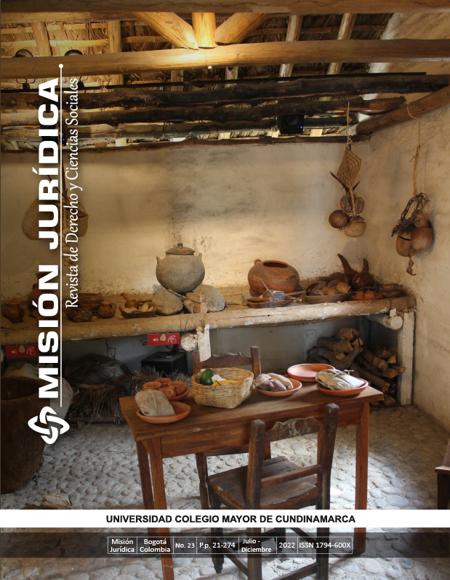Perfecting electronic consent in the e-Commerce B2C contracts in Colombia
Perfección del consentimiento electrónico en los contratos e-commerce B2C en Colombia
COPYRIGHT PROVISIONS
Every papper included in the magazine can be reproduced whole or in part, provided that respect for its original content, the source is acknowledged and is used with non-commercial academic. Legal mission and its content is protected under a license Creative Commons Attribution-Noncommercial-

Misión Jurídica is distributed under a Creative Commons Attribution-NonCommercial-NoDerivar 4.0 International License.
Based on a work in http://unicolmayor.edu.co/publicaciones/index.php/mjuridica/index.
Permits that go beyond what is covered by this license can be found at http://unicolmayor.edu.co/publicaciones/index.php/mjuridica/index.
Show authors biography
Due to the rise in the use of information technologies in almost every dimension of today’s life, trade relations have undergone important changes, Technological and scientific dynamics have been redefining the traditional ways of doing business: the dematerialization of what used to be necessarily tangible has generated consequences in the geographical barriers to delivery of products and provision of services. This paper aims to perform a legal analysis of the regulations applicable to contractual commercial relationships Business to Consumer (hereinafter B2C) established through digital platforms in Colombia, explaining and analyzing the legal perspective of risk in the perfection of electronic consent, in such way that achieves the identification of the different modalities of perfection in terms of consent in electronic consumer contracts at the national level. The methodology applied in this article is of a historical-logical type, by means of which a study of consent in contractual relations over time is made, and, consequently, the normative body that regulates this type of relations is reviewed. This study concludes that the progress in the use of technological and electronic tools in consumer contracts has generated serious risks that affect the consent of the consumer. However, and although there is still a lack of regulation in this regard, the consumer protection law provides tools that seek to protect the guarantees of consumers.
Article visits 286 | PDF visits 412
Downloads
- Albaladejo, M. (2001). Derecho civil. Introducción y Parte General. Libreria Bosh – Ronda universidad.
- Arango (s. f.) …
- Cárdenas, E. R. (2017). Derecho del comercio electrónico y de internet. Legis.
- Corte Suprema de Justicia. Sala de Casación Civil, sentencia SC 11815 – 2016 del 30 de agosto de 2016. M. P. Margarita Cabello Blanco.
- Corte Suprema de Justicia. Sala de Casación Civil, sentencia del 30 de abril de 2009. M. P. Pedro Octavio Munar Cadena.
- Decreto 410 de 1975, Código de Comercio, (marzo 27 de 1971), Diario oficial No. 33.339 del 16 de junio de 1971.
- Hubbert v. Dell Corp., 359 Ill. App.3d (Ill. Ct. App. 2005). http://pub.bna.com/eclr/hubbert081205.pdf
- Justiaus Law, Register.com, Inc (2004)., demandante, apelante, v. Verio, Inc., demandada-recurrente. https://law.justia.com/cases/federal/appellatecourts/F3/356/393/539823/
- Ley 1480 de 2011, Estatuto del Consumidor. (octubre 12 de 2011). Diario Oficial No. 48.220, 12 de octubre de 2011
- Ley 1564 de 2012, Código General del Proceso. (julio 12 de 2012). Diario oficial No. 48.489, 12 de julio de 2012
- Ley 57 de 1887, Código Civil. (mayo 26 de 1873). Diario Oficial No. 2.867, 31 de mayo de 1873.
- Ley 527 de 1999. Ley de Comercio Electrónico (agosto 18 de 1999) Diario oficial No. 43.673, 21 de agosto de 1999. Ley Modelo de la CNUDMI sobre Comercio Electronico. Comisión de las Naciones Unidas para el Derecho Mercantil Internacional, 12 de junio de 1996.
- Martí S, S. I. (1999) et al. v. La red de Microsoft, LLC, et al. (1999) WL 462175, 323 NJ Super. 118, 732 A.2d 528. http://www.internetlibrary.com/cases/lib_case19.cfm
- de Ros, R. M. (2000). El Consentimiento y el Proceso de Contratación Electrónica. En Derecho de Internet: la contratación electrónica y firma digital. R. M. de Ros Cerezo y J. M. Cendoya M. de V. (Coords.), pp.: 29-84. Aranzadi Thomson Reuters
- Medina, C. (2002). Introducción al Documento Electrónico. Nueva Época/Corporación Universitaria Libre.
- Messina, G. (2001). Defensa del Consumidor en la Contratación Electrónica. Abeledo Perrot.
- Moreno, M. (2002). Derecho-e. Derecho del Comercio Electrónico. Editorial Marcial Pon.
- Niño, D. (2017). Wrap contracts: manifestación de la voluntad por medios electrónicos. [Tesis de pregrado]. USTA.Alfred, P. (1997). El estado en la economía social de mercado: el modelo y la realidad alemana. Biblioteca digital Friedrich-Ebert-Stiftung. http://library.fes.de/fulltext/stabsabteilung/00074.htm
- Piaggi, A. (2002). El Comercio Electrónico y del Nuevo Escenario de los Negocios. Editorial palestra.
- Pinochet. O. (2004). La Formación del Consentimiento a través de la Nuevas Tecnologías de la Información. Ius Et Praxis. 11(2), pp.: 273-302. http://dx.doi.org/10.4067/S0718-00122005000200009
- Rengifo, M. (2016). La formación del contrato. Editorial Temis.
- Rincón, E. (2017). Derecho del comercio electrónico y de internet. Editorial Legis.
- Usma E, F. E. (2016). El Consentimiento en los Contratos en Línea B2C y su Protección bajo la Ley Colombiana. Cuadernos de la Maestría en Derecho. No. 5., pp.: 287-330.
- Vega, J. (2005). Contratos Electrónicos y Protección de los Consumidores. Editorial Reus.
- Villabella, C. (2015). Los métodos de la investigación jurídica, UNAM. https://n9.cl/wfh53
- Villalba, J. (2009). Aspectos Introductorios al Derecho del Consumo. https://www.redalyc.org/pdf/876/87617269006.pdf
















